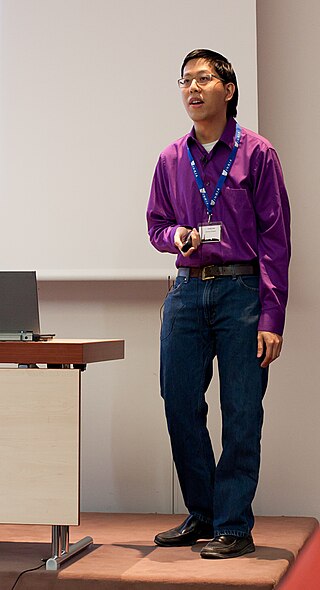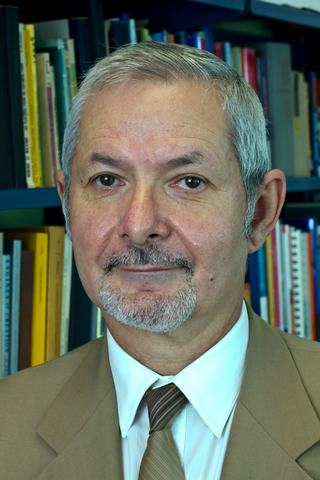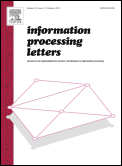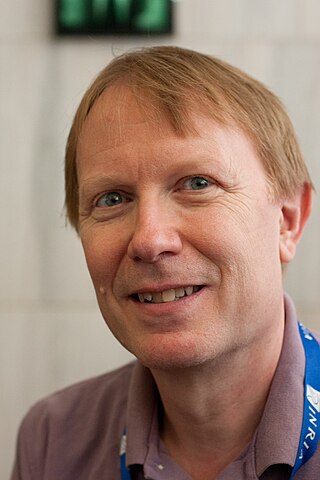Related Research Articles

A quantum computer is a computer that exploits quantum mechanical phenomena. On small scales, physical matter exhibits properties of both particles and waves, and quantum computing leverages this behavior using specialized hardware. Classical physics cannot explain the operation of these quantum devices, and a scalable quantum computer could perform some calculations exponentially faster than any modern "classical" computer. In particular, a large-scale quantum computer could break widely used encryption schemes and aid physicists in performing physical simulations; however, the current state of the art is largely experimental and impractical, with several obstacles to useful applications.
Computational geometry is a branch of computer science devoted to the study of algorithms which can be stated in terms of geometry. Some purely geometrical problems arise out of the study of computational geometric algorithms, and such problems are also considered to be part of computational geometry. While modern computational geometry is a recent development, it is one of the oldest fields of computing with a history stretching back to antiquity.
Theoretical computer science is a subfield of computer science and mathematics that focuses on the abstract and mathematical foundations of computation.
Bio-inspired computing, short for biologically inspired computing, is a field of study which seeks to solve computer science problems using models of biology. It relates to connectionism, social behavior, and emergence. Within computer science, bio-inspired computing relates to artificial intelligence and machine learning. Bio-inspired computing is a major subset of natural computation.

Timothy Moon-Yew Chan is a Founder Professor in the Department of Computer Science at the University of Illinois at Urbana–Champaign. He was formerly Professor and University Research Chair in the David R. Cheriton School of Computer Science, University of Waterloo, Canada.
Unconventional computing is computing by any of a wide range of new or unusual methods.
Joseph Frederick Traub was an American computer scientist. He was the Edwin Howard Armstrong Professor of Computer Science at Columbia University and External Professor at the Santa Fe Institute. He held positions at Bell Laboratories, University of Washington, Carnegie Mellon, and Columbia, as well as sabbatical positions at Stanford, Berkeley, Princeton, California Institute of Technology, and Technical University, Munich.

Godfried Theodore Patrick Toussaint was a Canadian computer scientist, a professor of computer science, and the head of the Computer Science Program at New York University Abu Dhabi (NYUAD) in Abu Dhabi, United Arab Emirates. He is considered to be the father of computational geometry in Canada. He did research on various aspects of computational geometry, discrete geometry, and their applications: pattern recognition, motion planning, visualization, knot theory, linkage (mechanical) reconfiguration, the art gallery problem, polygon triangulation, the largest empty circle problem, unimodality, and others. Other interests included meander (art), compass and straightedge constructions, instance-based learning, music information retrieval, and computational music theory.
Lateral computing is a lateral thinking approach to solving computing problems. Lateral thinking has been made popular by Edward de Bono. This thinking technique is applied to generate creative ideas and solve problems. Similarly, by applying lateral-computing techniques to a problem, it can become much easier to arrive at a computationally inexpensive, easy to implement, efficient, innovative or unconventional solution.

Cristian Sorin Calude is a Romanian-New Zealand mathematician and computer scientist.
Tensor software is a class of mathematical software designed for manipulation and calculation with tensors.

Parallel Processing Letters is a journal published by World Scientific since 1991. It covers the field of parallel processing, including topics such as design and analysis of parallel and distributed algorithms, parallel programming languages and parallel architectures and VLSI circuits.

Information Processing Letters is a peer-reviewed scientific journal in the field of computer science, published by Elsevier. The aim of the journal is to enable fast dissemination of results in the field of information processing in the form of short papers. Submissions are limited to nine double-spaced pages.
Natural computing, also called natural computation, is a terminology introduced to encompass three classes of methods: 1) those that take inspiration from nature for the development of novel problem-solving techniques; 2) those that are based on the use of computers to synthesize natural phenomena; and 3) those that employ natural materials to compute. The main fields of research that compose these three branches are artificial neural networks, evolutionary algorithms, swarm intelligence, artificial immune systems, fractal geometry, artificial life, DNA computing, and quantum computing, among others.

Joseph S. B. Mitchell is an American computer scientist and mathematician. He is Distinguished Professor and Department Chair of Applied Mathematics and Statistics and Research Professor of Computer Science at Stony Brook University.
The concept of biological computation proposes that living organisms perform computations, and that as such, abstract ideas of information and computation may be key to understanding biology. As a field, biological computation can include the study of the systems biology computations performed by biota the design of algorithms inspired by the computational methods of biota, the design and engineering of manufactured computational devices using synthetic biology components and computer methods for the analysis of biological data, elsewhere called computational biology or bioinformatics.
In quantum computing, quantum supremacy or quantum advantage is the goal of demonstrating that a programmable quantum computer can solve a problem that no classical computer can solve in any feasible amount of time, irrespective of the usefulness of the problem. The term was coined by John Preskill in 2012, but the concept dates to Yuri Manin's 1980 and Richard Feynman's 1981 proposals of quantum computing.
In quantum computing, a qubit is a unit of information analogous to a bit in classical computing, but it is affected by quantum mechanical properties such as superposition and entanglement which allow qubits to be in some ways more powerful than classical bits for some tasks. Qubits are used in quantum circuits and quantum algorithms composed of quantum logic gates to solve computational problems, where they are used for input/output and intermediate computations.
References
- ↑ "Parallel Home Page". research.cs.queensu.ca. Retrieved 2018-11-06.
- ↑ Akl, Selim G. (2016). "Editorial Note". Parallel Processing Letters. 26 (1): 1601001. doi:10.1142/s0129626416010015. ISSN 0129-6264.
- ↑ "IJUC editorial board". 2011-07-28. Archived from the original on 2011-07-28. Retrieved 2018-11-06.
- ↑ Computational Geometry.
- ↑ "International Journal of Parallel, Emergent and Distributed Systems". www.tandfonline.com. Retrieved 2018-11-06.
- ↑ "International Journal of High Performance Computing and Networking (IJHPCN) - Inderscience Publishers". www.inderscience.com. Retrieved 2018-11-06.
- ↑ "Quantum physics adds twist to chess | CBC News". CBC. Retrieved 2018-11-06.
- ↑ AKL, SELIM G. (2010). "On the Importance of Being Quantum". Parallel Processing Letters. 20 (3): 275–286. CiteSeerX 10.1.1.174.5566 . doi:10.1142/s0129626410000223. ISSN 0129-6264.
- ↑ Akl, Selim G. "Even accelerating machines are not universal" (PDF). Queen's University.
- ↑ "Recent Research Projects". research.cs.queensu.ca. Retrieved 2018-11-06.
- ↑ "Unconventional Computation 2007 - UC '07 - 6th International Conference on Unconventional Computation". research.cs.queensu.ca. Retrieved 2018-11-06.
- 1 2 "Selim G. Akl • CS-Can / Info-Can". CS-Can / Info-Can. Retrieved 2019-02-20.
- ↑ "Awards". www.cs.queensu.ca. Retrieved 2019-02-20.
- ↑ "Prizes for Excellence in Research | Office of the Vice-Principal (Research)". www.queensu.ca. Retrieved 2019-02-20.
- ↑ "Awards". www.cs.queensu.ca. Retrieved 2019-02-20.